
LEADERS UNWRAP THE STATUS OF PLASTIC WASTE MANAGEMENT IN PH
THE world had been increasingly drowning in plastic waste year after year, remaining to be a severe threat to humans and the overall ecosystem.
To discuss this, the Rotary Club of Makati and Punongbayan and Araullo Grant Thornton recently gathered leaders and experts in an event, titled "Unwrapping Change: Transforming the Philippines from its Plastic Legacy thru EPR (Extended Producer Responsibility)," which delved into the plastic waste issues in the country and explored how the EPR Act of 2022 or Republic Act 11898 could solve these challenges.
During the event, Rina Neoh, Environmental, Social, and Governance (ESG) Association of Malaysia secretary general, emphasized that the worldwide plastic production reached 400 million metric tons in 2022, a 1.6-percent increase from 2021, adding that Asia was the largest contributor to this.
A data published by Statista in January 2024 also revealed that humans produced more than 350 million metric tons of plastic waste each year. If no changes would be made, the global plastic waste generation was projected to reach one billion metric tons by 2060.
Neoh said the solution to this looming plastic crisis lay in transitioning to a circular economy. "By embracing circular economy principles, we can significantly cut emissions. This approach targets unsustainable practices in critical industry sectors such as construction [and] agriculture, potentially reducing emissions by 40 percent hopefully in 2050."
Neoh expressed that a circular economy would reduce the demand for raw materials and new products, thereby decreasing the emissions associated with material extraction and processing.
She also highlighted how plastic waste had severe environmental consequences, particularly in marine life and human health. She expressed that limitations in waste collection and waste treatment systems intensified these problems. So, ensuring proper collection and management of plastic packaging waste would be critical for building a reduce-and-recycling system that would enable a circular economy.
Considering all these, Neoh brought up the EPR Act as a powerful tool in the transformation, describing it as a "robust policy that fundamentally shifts the responsibility of its end-of-life management of products from consumers, governments to the producers themselves."
With the implementation of the EPR Act of 2022, Neoh said it could drive a paradigm shift toward a circular economy, where waste would be minimized and resources would be continually recovered and reused.
On the local government's part, Department of Environment and Natural Resources (DENR) Undersecretary for Policy Planning and International Affairs Jonas Leones acknowledged the integral role of plastic in human lives due to its convenience and practicality. He noted, however, that this convenience came with a significant cost to rivers, beaches and the environment, impacting both human health and the economy.
Leones explained: "The challenges we face in solid waste management are multifaceted. Our recycling capacity remains inadequate despite efforts to eliminate plastic waste, further exacerbated by insufficient facilities and funding for local governments and stakeholders." He continued, "The informal sector — crucial in this chain — still operates apart from formal systems. This oversight not only hampers recycling efforts but also deprives us an opportunity to bolster livelihoods within the sector."
Another challenge Leones raised was the lack of effective data and information management that resulted in poor quality of information needed to evaluate proper cost recovery and disposal mechanisms for waste management.
Despite all these, the DENR took one step forward in combating these gaps by developing a road map for the management of plastic waste and reduction of nonrecyclable single-use plastics in the Philippines to achieve the goal of zero plastic waste pollution by 2040.
The initial focus of the agency would be improving waste collection, segregation and plastic reduction across the country. In the next decade, the agency had set an objective to promote plastic recycling through investment, training and incentives.
"By 2040, we envision managing our demands for plastic and redesigning our product to be more adaptive to circularity through public education and legislative actions," said Leones.
He also shared some milestones in the implementation of EPR Act. Since the enactment of EPR law, Leones reported that a total of 917 companies and establishments have already submitted their EPR programs. This was composed of 129 obliged enterprises (which referred to product producers, required to implement EPR programs), 12 collectives with 62 members and 8 producers responsibility organizations with a total of 427 members.
Leones further stated that plans were already underway to establish a policy dialogue platform to improve simpler waste economy and climate change policies as well as to collaborate with local government units to implement sustainable practices with a gender and social inclusion perspective.
Finally, he added that the DENR's vision for the future included further development of circular economy practices, EPR compliance and sustainability initiatives to foster a greener and more resilient environment.
2024-07-02T20:26:15Z dg43tfdfdgfd